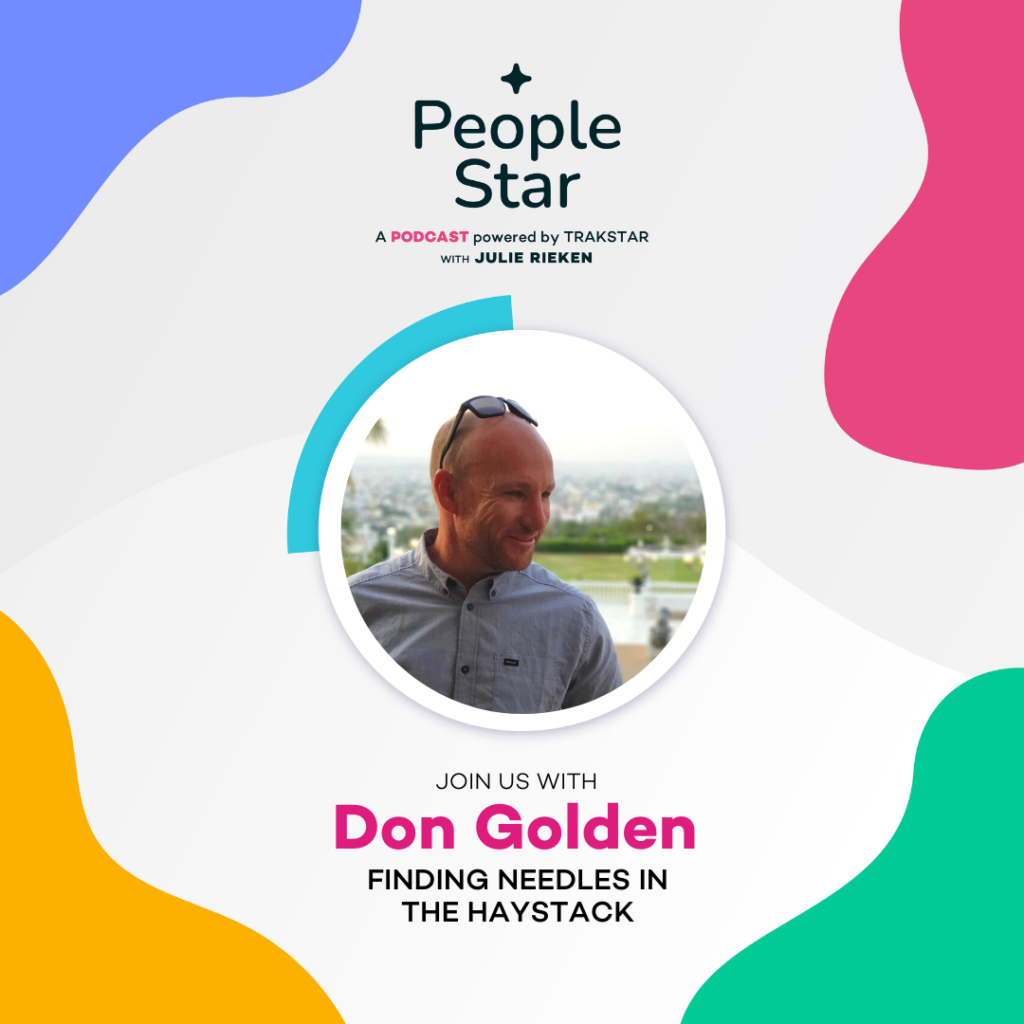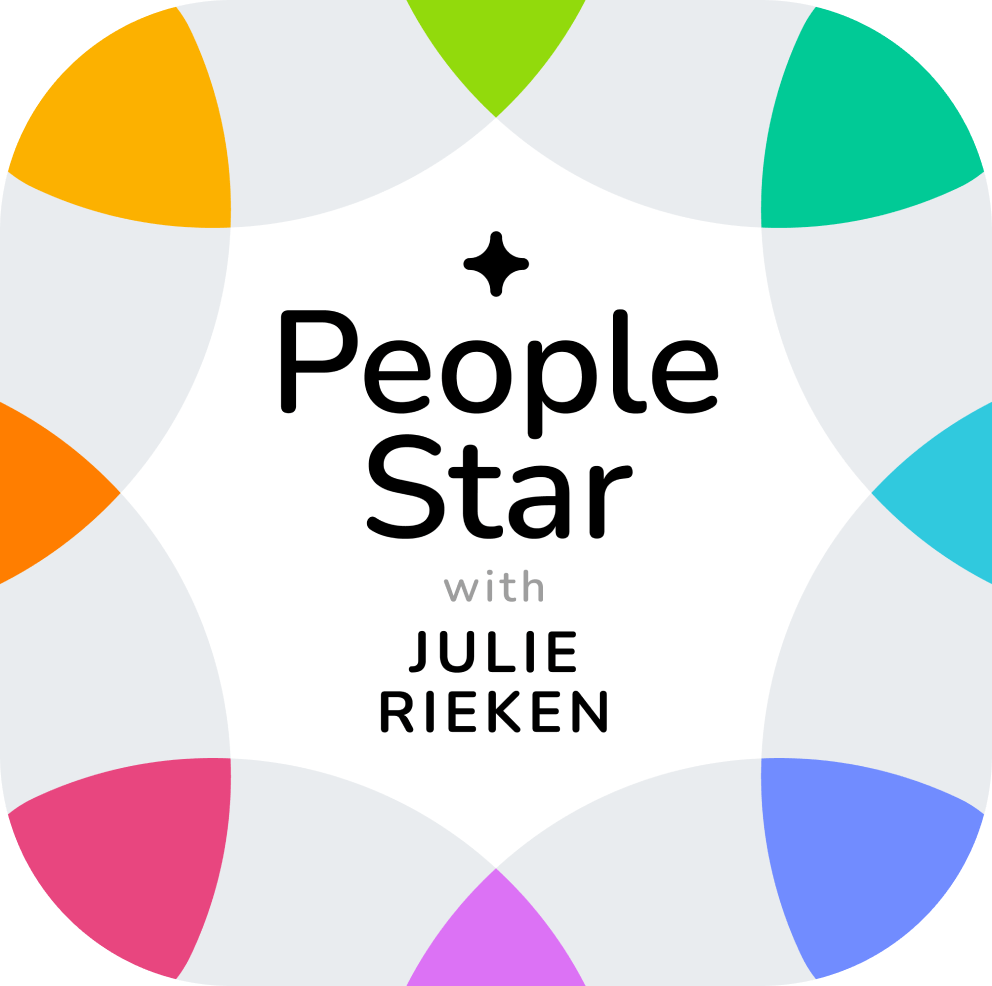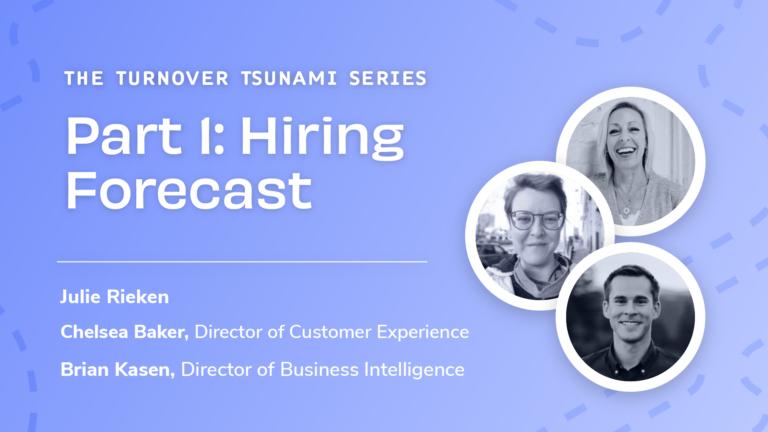PeopleStar Podcast_Don Golden: this mp3 audio file was automatically transcribed by Sonix with the best speech-to-text algorithms. This transcript may contain errors.
PeopleStar Podcast Intro:
Welcome to the PeopleStar podcast. We deliver leadership perspectives from industry experts on their people, architecture, routines, and culture as they solve HR's newest challenges. And now your host, Julie Rieken.
Julie Rieken:
Hello, welcome, Julie Rieken, host of the PeopleStar podcast. Today, I am super excited to have Don Golden with me. Don is the CEO of Precision Sample, and they do super interesting work where they do market research. So, Don, it's my understanding that if a car company wants to know if the red model or the blue model will sell better, that you go out and help companies make good decisions based on market research, is that right? Or what color would you add to that? And welcome!
Don Golden:
Yeah. Oh, thank you. Happy to be here! Appreciate you having me on. Essentially, we play a role in that process, specifically, we're online or a digital data collection firm, which means that we work with market researchers who designed the surveys or the research where they want to find out if customers like a red car or a blue car better. And then we play the role of taking their survey, programming it and turning it into an online instrument or experience, and then supplying the participants. When people ask me what I do, I usually tell them I look for needles in a haystack all day because it's never as simple as, you know, if we want to find people who own cars, in the example that you gave, they want to find people who own specific types of cars and they are planning on buying a car in the next 90 days. And so essentially, we have to do a lot of profiling of participants and talk to a lot of people to find the target for our clients. And essentially, once we've, once we've got all the responses that they're looking for, we package up all the data and we send it off to him and we let them do the analysis.
Julie Rieken:
That's super cool. What a great company. Don, you said something that I'd like to follow up on, as a leader, you said that you are looking for needles in a haystack. And when we are looking for employees, we're often looking for a needle in a haystack. And I know that you select people in a very specific way. How do you find employees that are needles in the haystack?
Don Golden:
Sure. Essentially, in our interview process, I really have two qualities in an employee that I care about most. One, that they're smart. And you find that out by looking at people's backgrounds and education and having a conversation with them. And two, that they're nice people. I really, you know, sometimes our business can get stressful like lots of businesses. And I found when I've relaxed the nice quotient that things have gotten difficult in the company. So those are really my two primary criteria. And then ultimately in the interview process, I have really only one question that I care about that I ask people. And this is stolen from somebody I forget, maybe it was Mark Cuban, something I saw on LinkedIn years ago. My one interview question that I ask is, you know, tell me about your previous job where you had, you know, a really upset client or person that you were dealing with. And of course, out of that, you get a whole long story about what they did and how they resolve the issue and the conflict. But ultimately, all I'm looking for in their response is whether or not they cared, whether or not they cared about, you know if they had empathy towards the problem that the person on the other end of the line was having because ultimately I only want people here that actually care about the work that they're doing and our clients. And so that's my primary focus.
Julie Rieken:
Those are really interesting things to look for, smart and nice, and asking them to tell about how they dealt with something that was challenging, like another person on the end of the line that was upset. And I was like, that's worked for you. Have you, tell me the story about one of the great employees that you might have had? And what did they do that was great after you found this needle in a haystack, you've put them through your guidelines, do you have any stories about great employees?
Don Golden:
Yeah, absolutely. So as a startup and as a bootstrap startup, I've historically been pretty frugal with bringing people aboard. But really, in the last couple of years, I've really started to focus on bringing a higher level of employee into the business. And it's been you know, it's an, now we're at a time where we can afford it and it's paid dividends. And one example is a woman that came aboard with us in the last year, and she came from… She's actually German. And she worked at BMW, in their market research department for many years and relocated here because her husband's an American. And I really had to dig deep into the pocketbook to bring her on board. She's, you know, she's very smart, very sharp woman, and put her into a role of essentially managing a lot of our supply sources of respondents. And she has brought such a much more highly analytical approach to it that has helped us optimize that process and really just took the job and ran with it. And so, you know, I mean, that just really reinforced my belief that we have to really strive for a higher level of professional that we bring into the organization. And we've been doing that and the results have been amazing.
Julie Rieken:
That's super great. You know, it's interesting that here you were asking a lot of questions. You're doing market research. You're finding really great people. Is this what you always envisioned doing? How did you end up doing this thing? Market research. How did you end up here?
Don Golden:
Yeah, that's an interesting story, actually. I was actually at my first kind of in-person conference last week and over 18 months. And I was actually having, there were some more junior people there, and, you know, was having a conversation with them and some of them weren't really sure they were in the right industry. And, you know, I told my story of when I got out of college, it was right in the original Internet boom days. And I decided I wanted to work in the Internet. I didn't really care what I did. And I think that that I mean, that's advice that I give to a lot of younger professionals, is don't necessarily worry about exactly what you're doing, if you're someone who's really kind of a broad-based background or education, find an industry that's interesting to you and go work there and then you'll find your place. And that's exactly what happened with me. I decided I wanted to work in the Internet. And I just you know, I took whatever job I could get. And eventually on my career path led me into basically doing marketing and finding audiences and delivering them to my company, you know, whether it is to drive sales or I worked on digital music community, and that experience played perfectly when I got the job in the industry that I am today. And I was tasked with going out and finding those needles in the haystack, you know, enticing them to come and join our panel of survey participants so that, you know, it all went from there. I worked for that company and I decided I thought I knew how to do it better. And, you know, that's still up for debate. But, you know, just that's how I kind of found my way into what I'm doing today. And that's still my core skill is digital marketing and finding needles in the haystack. And, you know, in talking them into doing what I want them to do online.
Julie Rieken:
That's amazing. And I love the advice for people that are just starting out, like find an industry you like, go work in it and see what happens. And maybe along that line, that's a great piece of advice for people. Is there any advice in your head that's been ringing, that's any advice that you've received recently that's been ringing in your head?
Don Golden:
Well, unfortunately, it's advice that it's a lesson that I've learned multiple times over the past five or six years of running this business, and it's ultimately to mitigate your risk. You're running a business and you know, one of your customers is a significant portion of your revenue. You know, 30, 40, 50 percent plus or one of your suppliers is a significant portion of your supply chain. You know, you really want to mitigate your risk by not allowing that to happen. So no customer should ever be 10 or 15 percent more of your revenue. No supplier should be ever, you know, 10 or 15 percent more of your supply chain and, you know, mitigate your risk that way because of, you know, the worst case happens and you lose your best customer, you lose your best supplier, it really sets your business back so far and it takes so much time to recover from that. So really risk mitigation in terms of customers and supply chains is my best advice for entrepreneurs and people growing the businesses.
Julie Rieken:
That's cool and that's really true. And when you think about those things, if you think about having too much of your business weighted in one place, that can be very stressful, that relationship and knowing that there's so many dependencies on that customer, that relationship, which maybe leads me into the final question, which is about energy and where you get your energy, because you've got to have energy to follow through with making sure that you're in the right space, making sure that you're diversified and keeping all of those pieces running in a healthy way, how do you stay energized?
Julie Rieken:
Change. Change is my biggest energizer. I love.
Julie Rieken:
That can be stressful for people, but for you, it's your energy source.
Don Golden:
I love it. I love it. Yeah. So every day we work on different projects here. So we do we feel typically about a thousand different surveys for clients a month. And they're all different and they all have their challenges associated with them. And so that was the change that attracted me to the industry in the first place. But then now that I don't really deal in the day-to-day about the project, it's growing the company and finding new products for us to, you know, to offer to our customers to enhance our offerings. And so I'm constantly, that's what gets me up in the morning is, you know, finding new ways to grow the business with, you know, new innovative products. And I love it.
Julie Rieken:
Ok, well, that actually leads me to one more question, because it's super unusual to hear people say that change is their energy source because it can be the opposite for so many people. What do you think your superpower is as a leader then? Is it finding that energy? Is that something else? What's your superpower?
Don Golden:
I think my superpower is I'm really I'm just one of the guys, you know, I hate it when people call me the boss, right? I don't want to be the boss. You know, I'm just the, I'm just the guy kind of set in the direction that we're all going in. And I spend a lot of time speaking with and relating to my team. And I don't, I don't ever want to be this kind of big, scary person on the top. You know, I just want to be one of the guys and I want to be a part of the team. And that's what I really focus on.
Julie Rieken:
Humility, approachability, being a part of the team. Those are really good powers. Yeah, that's awesome. Don, it's been.
Don Golden:
It works for me.
Julie Rieken:
It's been super great to talk with you and to hear a little bit about your perspective. And it does work for you! And Precision Sample, just a great company. You know, if anybody is looking for ways to think about how to find market research, of course, Don and his company are a great resource. And Don, it's been a pleasure to visit with you today.
Don Golden:
Thanks so much for having me, it's been super fun. Thanks, Julie.
PeopleStar Podcast Outro:
Thanks for listening to the PeopleStar podcast. For the show notes, transcript, resources, and more ways to get a seat at the table, visit us at Trakstar.com/Podcast.
Sonix has many features that you’d love including powerful integrations and APIs, automated transcription, secure transcription and file storage, share transcripts, and easily transcribe your Zoom meetings. Try Sonix for free today.




